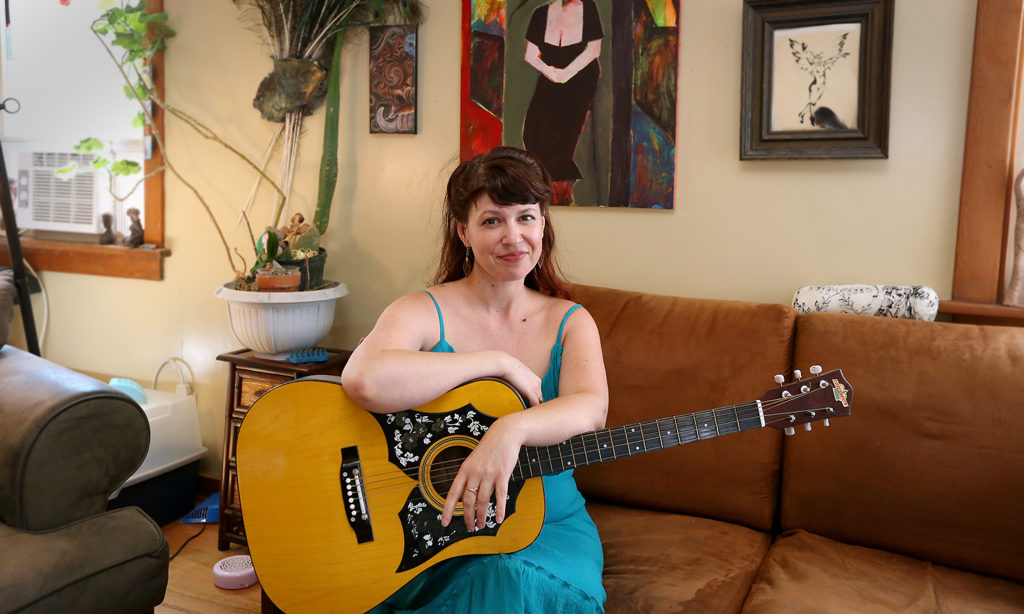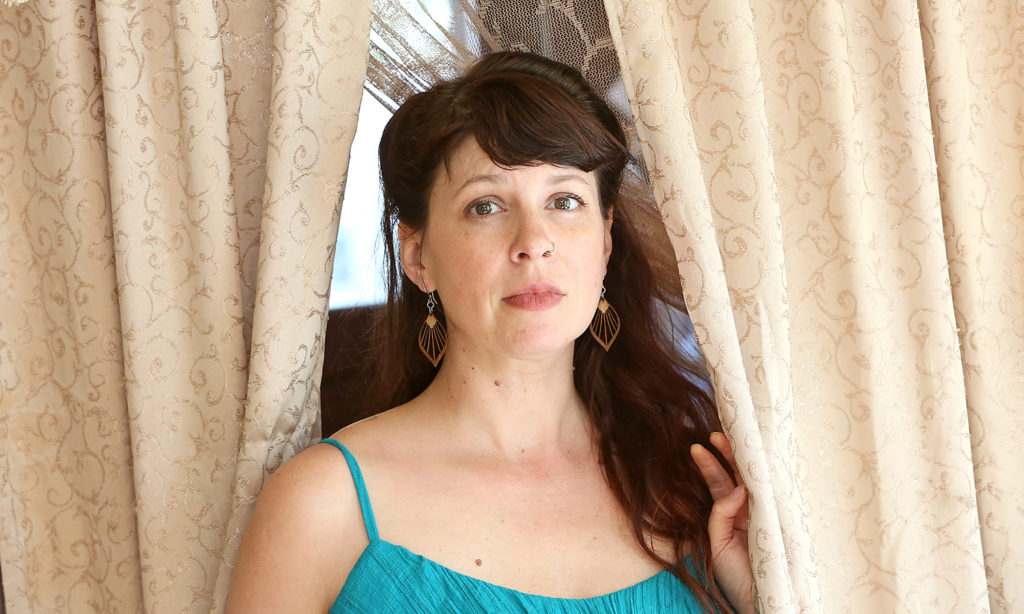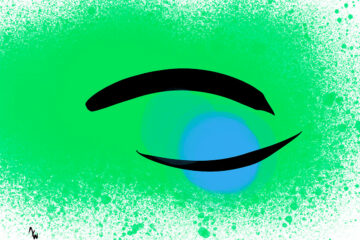A guitar hangs on the wall, and another leans into a corner in Xanthe Alexis’ living room. Poetry books are neatly stacked on the coffee table. An abundance of morning light and the art placed here and there fills out the vibe of creativity, comfort and quiet joy.
Xanthe, 38, is known throughout the region and well beyond as a healer, an empathic spirit who feels into her work and shares the connections she finds there. Through song and therapy.
She is an integral part of Manitou Wellness Center with her mother, Georgi Gochis and sister Joy Purna. Xanthe also is a songwriter who stirs her audiences with the power of honest lyrics, nimble touch on a six-string, and the strength of her heart-filled voice.
Xanthe sat down with Humanitou and shared insights about these connections, the balance of being a performer who also is an introvert, and her experience as a mother of two teenage sons in today’s landscape of humanity.
Humanitou: What is the role of music in your life? You sing and play from a place of deep feeling.
Xanthe: I think that, originally, it was a way to self-soothe, and because I’m a healer, that’s kind of the vein that everything goes through is healing.
I had this really cool experience. I was in Carbondale (Colo.), and my sister, Joy, was with me. It was this precious audience, and they were crying. The wall was totally down. They were asking me questions. I’m like, I’m on stage. (laughs)
What my sister reflected on, and it’s really what I’m about, is, “Your music is this invitation for people to feel these emotions that maybe are taboo or repressed, or whatever, in our culture.”

That’s totally my intention, to draw out the space to feel. Whatever that may be, if the feeling is dark or if it’s joyful or if it’s sadness, just to be able to feel it. That’s always been my intention with music.
My music, more than anything, is the way that I have conscious contact with what I perceive as my higher power or creator. Because, often times the songs come out of nowhere and they’re whole. I get a sensation and I go to the instrument. The chords are there.
A lot of times I don’t know how it’s going to make other people feel or what it’s going to express, because I’m not a hundred percent sure what it’s about, often until much later.
Humanitou: What is your healing practice through Manitou Wellness?
Xanthe: I am a reiki master. I’m a lineage holder of an Eastern Shaolin tradition that is acupressure, drug capsule release, resistant stretching.
Essentially, I move bone by working with fluid movement in the soft tissue. But it’s with a touch that is very, very light. It’s a really cool modality.
Then, because I often work with people in pain and often people who have had trauma, I felt like I had a missing piece when the trauma would come up. I felt like it was irresponsible as a manual therapist to not be able to handle or hold space for someone with those traumas.
So, I went back to school and became a somatic trauma resolution therapist, which is a talk therapy. That’s all about the nervous system.
I can see a lot of different kinds of people in one day.
Humanitou: What’s the difference between that kind of talk therapy and going to a psychotherapist?
Xanthe: It’s all about learning how to regulate your own nervous system by tracking sensation in the body. This is what I’ve been in deep contemplation about lately.
The mind and the spirit can move about from place to place. In our language, we even say, “My mind was wandering.” And spirit, we know, can move. But the body from moment of conception is in the present moment.
No one could ever say, “Hey, I saw you downtown,” when you were at your house. That is just not possible. The body is the keeper of the present moment. In the body is where we find the blocks and why we can’t be in the present moment.
The talk therapy is a lot about resourcing, getting people resourced enough to stay in the present moment. Often why we wander off is we’re trying to get out of whatever feeling the present moment is bringing to us.
So, we work on resourcing someone in the present, and then we begin to go into tracking the sensation, seeing what comes out. The body knows what it needs to happen.
I’m kind of a witness, a neutral observer to the intelligence of someone’s own body opening up and unraveling it.

Humanitou: You also are a mother of two teenage sons. What’s your take on masculinity in today’s world?
Xanthe: I think about this a lot. I was really surprised when they transitioned into young men through puberty, the coaching (from me) around restraint and honor and dignity, integrity.
Young men go through puberty and they have all this life force, and social media is giving them messages and their friends are giving them messages. I tease sometimes that I sit in the kitchen and wait for the next after-school special to arrive in my home. (laughing)
They don’t have: Now you go out with an elder and you learn what it means to be a man. Now you learn what it is to serve your community. They don’t have these rites of passage, so they have all these questions.
We’ve had to have conversations about, “No means no” and “Your presence as a man might make someone uncomfortable” and how to be aware, so that you don’t do that ever, to a woman, especially.
All of these things that I didn’t realize that I would have to do, because I’m a woman. (We’ve had) talks about feminism. Obviously, this is a matriarchal home, so that’s just not even a thought for them. They’ve been raised in a female-led home.
Men carry a lot that I didn’t realize. Men are in this transition time, “This is not acceptable, but we want this from you.” I think men feel really pulled, “What is my place?”
I didn’t realize how much of a task that would be to be present for that stuff, and not just send them out and they’re going to get these lessons from the world.
No, we don’t have that in our culture, so it has to happen in our homes, in our tribe, in our communities.
I think women are doing it, women are leaning in and men are doing it, too. So, oh, yeah, masculinity is a big deal in our house. It’s on our table a lot.
With my son that recently graduated high school is leaving, I know that my healing work is my contribution, and my music, but he is my contribution, too.
What kind of man I’m putting out into the world, it’s very important to me. I know we need good men right now.
Humanitou: Society often puts on parents responsibility for their child’s actions even after they are grown enough to roam far beyond home.
Given what you just said, how do you allow space for your sons to represent the values you’ve instilled but also to stand on their own with decisions you might not agree with?
Xanthe: I was thinking about this this morning. I don’t want a perfect child. My intention is to help cultivate a human that knows that they’re human and can be resilient against their own adversities.
I have teenagers (laughs), so there are plenty of times they are up to stuff I don’t agree with. But my mom gave me this brilliant kernel. She had five of us and we were all over the place personality-wise.
I asked her once, “You never judged me. How on earth?” I was a hellion. But she never judged me. She said, “If I judged you, I would no longer have influence. That’s all that I want, is to have some influence.”
That’s something I really take to heart. I want to still have influence. I want them to be able to come to me and be honest. That takes knowing when to stop talking and just listen.
In somatic work we call it the implicit conversation. It’s not the stuff you say out loud. It’s the implicit message to them that you’re a fulling functioning human and you’ve got this.
Humanitou: I’m reading a book called Quiet, by Susan Cain, about introversion. It highlights that introverts are not deficient, as many social norms seem to imply, and that introverts, in fact, bring a lot to the table.
Are you an introvert who revs up the energy when it’s needed or are you– You’re already nodding …
Xanthe: (laughing) It’s funny. People assume I’m extroverted. It wasn’t until I was in my mid 30s and kind of feeling exhaustion and dis-ease within myself that I really realized that I’m very introverted. I’m a homebody.
I’m a homebody because I’m raising children, but I’m also an empath. It’s what makes me a skilled healer, that I’m able to be so deeply empathic with people. That empathy makes the outside world feel pretty abrasive at times.
I’ve had to learn how to nurture myself where I’m at, and not fight against it. If I decide to go out and see music and support another artist, or go to a First Friday, that means tomorrow I’m going to need to have quite a bit of home time.
I find that the more I’m able to serve how introverted I am, the better I become at connecting with other people, and learning how I connect.
Humanitou: Shifting gears, you touched on another subject I am familiar with. In one of your recent Instagram posts, you mentioned sobriety.
Xanthe: Yeah. I’ve been sober now for two years, in August. It was just time for substances to go. Alcohol, marijuana.
Humanitou: There’s journey there. Learning, humanness. Do you mind speaking to that experience for you and what you bring from that?
Xanthe: I was closeted in my use of substances. When I made the decision to take on sobriety, I had a lot of people that were, like, “You don’t have a problem.” But it was a problem for me.
I knew that I was wearing masks to cope, and that those masks were limiting me. It’s a spiritual practice to choose sobriety every day for me. It’s a way that I serve my physical body, my mental health.
And I don’t have any judgment of what other people do, not even my children. They are going to experiment, and have experimented. But for me, it was a bandage that allowed those wounds to just fester. I needed to take off that bandage and look at the wound.
I knew I had hit a ceiling in my own growth, that if I didn’t take these substances out that was going to be it, that was going to be my limit.
There’s more of a conversation about it now than there has been when we talk about healing, even in new-agey yoga circles, healing circles. Looking at the way we use substances, at some point in reflection, it’s going to be part of it.
I’ve been pretty private about it, but every once in a while I do say something about it. I don’t feel like it’s something I need to be on a soapbox about. It’s really deep for me.
But the deeper I go into having a sober mind and a sober body, the more I realize it’s a living expression of just being joyful to be here without those chains.
And they were chains for me. They’re not for everyone.
Humanitou: Thank you for sharing that. It’s so relatable. The cravings for external salves and numbing agents are universal, as are the emotional and psychological cycles they create within us.
Let’s wrap up with a one-word free association: love.
Xanthe: Oh my goodness. So, the other day I was in prayer and meditation in my morning practice and this thought came out of nowhere.
It was: True love is not the desire to bring your beloved closer to you; true love is the desire to bring your beloved closer to the divine.
I thought love, the expression of love, is about wanting to see the best in someone or creating the best piece of music I can create, or encouraging my children to shine, and taking love from this framework of, I’ve got to work on myself and get over these personal demons so that I can love better.
It’s flipping that and saying, my responsibility to those that I love is to help cultivate their own connection to the divinity that’s inside of them. Whoa. That seems doable.
 This Humanitou conversation is cross-posted at PeakRadar.com. PeakRadar.com is the Pikes Peak region’s cultural calendar and digital cultural center, connecting residents and tourists with our vibrant arts community. Your source for what’s happening is PeakRadar.com!
This Humanitou conversation is cross-posted at PeakRadar.com. PeakRadar.com is the Pikes Peak region’s cultural calendar and digital cultural center, connecting residents and tourists with our vibrant arts community. Your source for what’s happening is PeakRadar.com!


